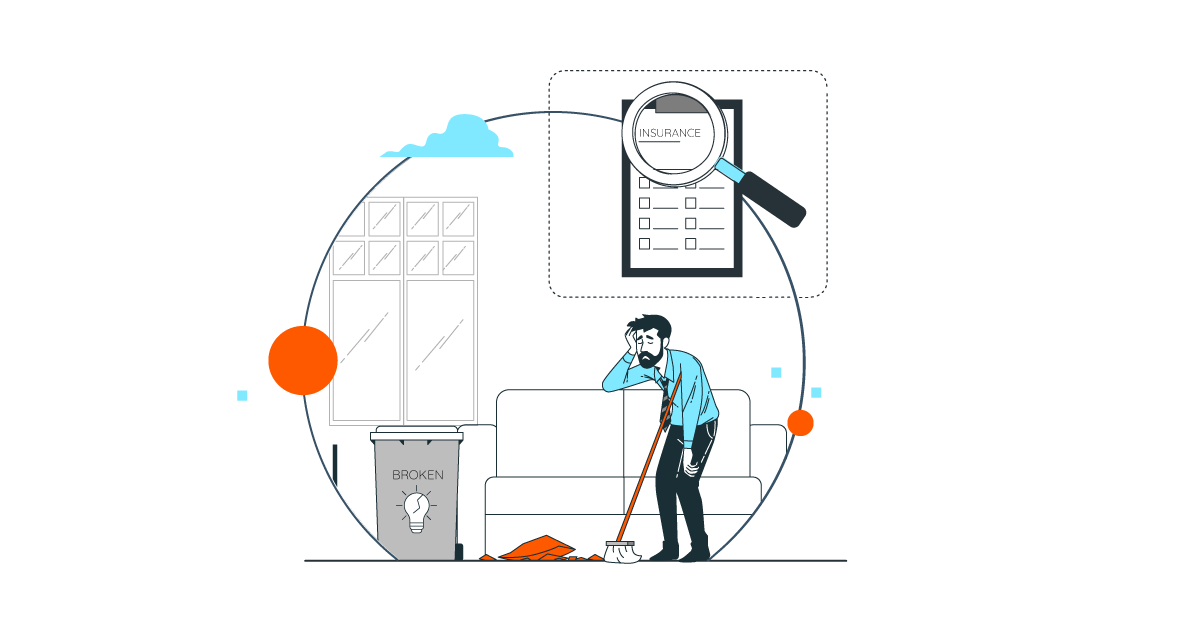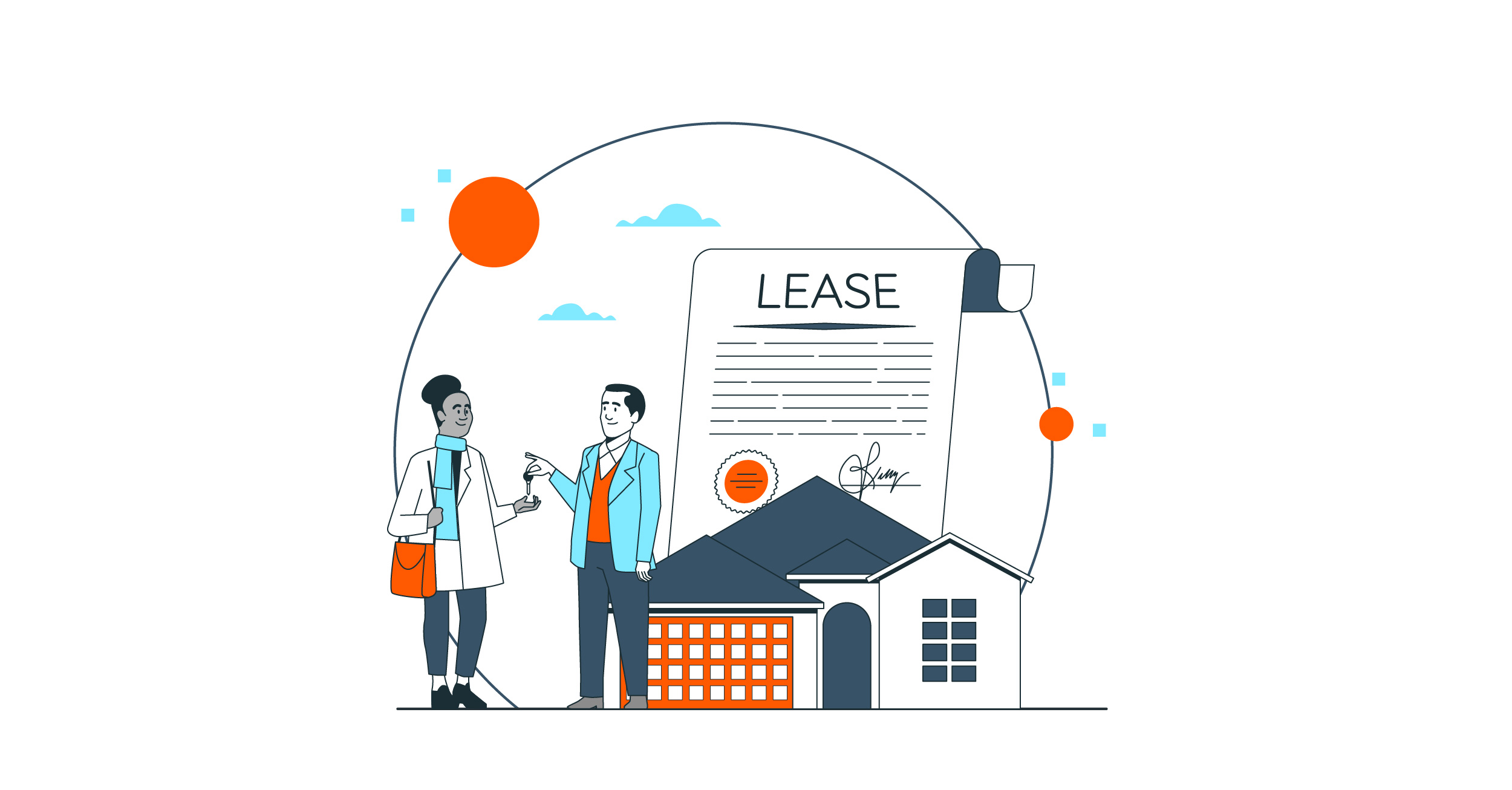
|
Highlights:
|

Landlords need to have the right insurance. It helps to protect you, your property, and your tenants when accidents happen or things go wrong.
There are different types of landlord insurance available, so it's a good idea to compare policies and find the best one for your particular situation.
This article lists the various types of landlord insurance and provides tips and things to consider when buying it.
What Is Landlord Insurance?
Landlord insurance is a type of insurance policy designed to protect landlords from financial losses or unexpected costs.
These losses could occur due to damage to one of their properties, for example, from storm damage.
Landlord insurance usually provides cover for the building and items provided by the landlord, but not the tenant owned contents,, as well as liability cover in case of any legal action taken against the landlord.
Most landlords have different insurance policies for each of their properties. But you can get portfolio policies that will cover all of them at once.
Do You Need a Landlord Insurance Policy?
Landlords are not legally obliged to buy a dedicated insurance policy.
But you can’t use a standard home insurance policy on a rental property. So if you don’t have landlord insurance, you won’t be covered.
If you have a buy-to-let mortgage on your property, your lender will usually require you to take out landlord insurance before you rent it to tenants.
How Is Landlord Insurance Different to Normal Home Insurance?
Rental properties present a very different set of risks to their owners than an owner-occupier situation would.
Some of these risks include:
-
You are less aware of problems at the property.
-
It is harder to maintain the property because you can’t go in whenever you want.
-
You have a legal duty of care over the occupants of your rental property.
-
Part or all of your income may depend on rent being paid on the property.
Landlord insurance policies are designed to protect you from this different set of risks.
What Types of Landlord Insurance are Available?
Landlord insurance generally falls into three main categories:
-
Buildings insurance
-
Contents insurance
-
Liability cover
You can also pay for additional coverage on your policy. Common examples are legal expenses and emergency cover.
Landlord buildings insurance

This is similar to what you would get with a typical homeowner insurance policy. It covers you for any damage to the structure of your rental property.
This is usually the minimum level of cover that buy-to-let mortgage providers require from a landlord before they will lend to them.
Buildings insurance policies usually protect landlords against:
-
Theft
-
Vandalism
-
Malicious damage
-
Natural disasters
-
Subsidence, heave or landslip
-
Burst pipes
-
Fire or smoke damage
-
Oil or water damage
-
Damage from vehicles, trees, animals, aircraft, aerials and masts
-
Complete destruction of the property
If you own an individual house then you will buy your own policy. But if you own a flat, the building’s freeholder will usually have a shared block policy that you’ll contribute to via the service charge.
|
Contents insurance
This covers items that you have provided in the property.
This could include:
-
Electrical items
-
Carpets
-
Furniture
It protects these items against the kinds of problems listed above for buildings insurance.
Protecting your property from accidental damage caused by your tenants usually costs extra.
It does not cover your tenant’s contents. They will need to get their own contents insurance policy for this.
Home emergency cover
This is normally an add-on to landlord buildings insurance or contents insurance policies. It protects you and your tenants against the loss of essential household services like water and electricity.
It includes cover for problems relating to:
-
Plumbing and heating
-
The roof
-
Doors and windows
-
Drains, pipes and sewers
-
Pests
-
Electricity
-
Losing keys
|
Liability insurance
Also known as public liability cover, this protects you if you or your tenant is injured at your property.
It is used to protect you if you are found legally responsible for an accident that happens at your property.
Some examples of events covered by this insurance include:
-
A tenant is injured by a poorly maintained fitting
-
An electrical fault causes a fire that damages your tenant’s belongings
-
A carbon monoxide leak makes your tenant seriously ill
In the worst cases, the level of compensation that you need to pay can run into millions of pounds. Because of this, landlord liability insurance policies often have very high coverage limits.
Legal expenses
This is usually sold as an add-on to public liability cover. As the name suggests, it covers you for any unexpected legal expenses you may incur.
The kind of events covered include:
-
Employment disputes
-
Contract disputes
-
Personal injury
-
Criminal negligence
-
Property protection
Rent guarantee insurance
This is sometimes known as tenant default insurance or rent receivable insurance.
This covers you when you don’t receive any rental income from your property. This could happen for a variety of reasons, including:
-
Your tenant cannot afford to pay the rent
-
The property is empty and you cannot find a new tenant
-
There is a dispute between you and the tenant
Rent guarantee insurance usually covers you for legal expenses, as it is often used in evictions and disputes.
Unoccupied property insurance
Sometimes properties are left vacant for long periods of time. When this happens, it’s a good idea for the landlord to buy unoccupied property insurance.
This protects it from various issues while the property is vacant. These problems could include:
-
Theft
-
Vandalism
-
Natural disasters
-
Leaks
This kind of insurance is often purchased by student landlords who know their property will be empty out of term time.
It’s also used by landlords who recently purchased a property but think it will take some time to get a tenant.
Property portfolio insurance
As mentioned above, landlords with multiple properties can purchase one insurance policy to cover all of them.
Property portfolio insurance policies are attractive because they are cheaper per property and make buying and managing insurance policies simpler for the landlord.
Things to Consider When Buying Insurance
Here are some things you’ll need to consider when buying a landlord insurance policy. They are common to most types of insurance, although there are a few considerations unique to landlord insurance.
-
Check the list of perils
This is the list of events you are covered for. It might include fire damage, theft, flooding, etc.
It’s also useful to know any exclusions (things that you are not covered for). A good example of this is wear and tear.
If there are any potential perils missing and you want them covered, see if you can add them to your policy. You can even ask to remove some perils for a discount.
-
Check the sum insured
This is the maximum amount that your insurance company will pay you in the event of a claim.
You need to ensure that this number matches the rebuild value of your property. You can find this value in the survey documents which you received when you first bought the property.
Note that the rebuild value is usually lower than the market value.
-
Choose your excess
This is the amount that you pay towards the claim. In other words, if your claim is £800 and you have an excess of £300 then your insurer will only pay you £500.
The higher your excess, the less you pay for your policy. Landlord policies often come with multiple excess figures for different perils.
-
Review conditions
Conditions are the obligations you need to fulfill so that your insurance policy is valid. Essentially, this means that if you are negligent in your duties as a landlord and a property owner then your insurance company may not pay out when requested.
Say, for example, that you don’t have an electrical safety certificate for one of your properties and an electrical fire causes the house to burn down. Your insurance provider may say that you have not met your policy’s conditions and you may not be covered.
Therefore, it’s a good idea to know what is expected of you.
Tips for Buying Landlord Insurance
Buying landlord insurance is similar to other forms of insurance. There are a few things you should do, including:
Provide accurate information
Double check all the information about elements of your property when applying for a policy. Make sure the information you provide is as complete and accurate as possible.
This ensures that you are paid the right amount when the time comes to claim. If you’ve lied on your policy documents then the provider may even refuse to pay out.
Read the key facts
This is a short document that is provided to you when you buy an insurance policy. It’s a good way to quickly understand what you are covered for and what the different terms mean.
This allows you to spot any gaps in coverage that you weren’t expecting. You can then contact your insurer to sort this issue out.
It’s important to do this straight away, as most insurers give a two-week window known as a cooling-off period. During this time you can choose to exit the policy without charge. After the two weeks are up you are likely to face a charge for leaving the policy.
Report changes
You’ll have to report certain things to your insurance company. For example, if your property is left empty for a period of time. That’s because it will be deemed a higher risk during this time. You may have to pay a higher premium until you find a new tenant.
Claim as soon as possible
Your insurer will want you to deal with issues that require a claim as soon as possible. Otherwise the problem may get worse and become more expensive to deal with.
You should report your claim as soon as possible. Some insurers put a limit on the amount of time you can wait before you make a claim, so make sure you understand how long that is.
Keep all documentation relating to a claim
Make sure you keep all estimates, invoices, receipts and any other documents relating to your claim. You should also take photos or videos.
The more information and evidence you can provide, the more likely you are to get the payout you need to rectify the problem.
Landlord Insurance FAQ
Do I need a landlord insurance policy if my family or I live in the property?
Yes, you normally do. If you have a buy-to-let mortgage or a tenancy agreement in place then you need landlords insurance, even if you are renting the property to family members.
As mentioned above, this is a requirement from your mortgage lender rather than a legal requirement.
However, renting to family members may mean that you don’t feel the need for optional policies like rental income insurance.
Do I need landlord insurance for a holiday let?
Holiday lets usually have serviced accommodation insurance or holiday home insurance. The two are slightly different to each other, and to landlord insurance.
-
Serviced accommodation insurance: For holiday lets that include services like housekeeping and cooking. It usually covers buildings, business interruption, public liability and employers’ liability.
-
Holiday home insurance: Similar to serviced accommodation cover. It includes loss of rent and alternative accommodation rather than business interruption cover.
Do I need landlord insurance for a flat?
It depends on whether you are a freeholder or a leaseholder. If you are a freeholder then you own the property and the land it is on. Therefore, it is usually the freeholder who arranges insurance for the whole building.
Leaseholders own all or part of the property for a set period, but not the land it is built on. They usually pay a service charge to the freeholder. The cost of the landlord insurance policy is usually covered in this charge.
Summing Up Landlord Insurance
Having a landlord insurance policy is vital if you own a rented property. However, the type of policy you have, how much you pay and the extent of your coverage depends on your specific property and situation.
It’s worth taking the time to understand your policy in full before buying it and providing your insurer with accurate information. If you don’t, you may find that you are not covered when you go to make a claim.
If managing landlord insurance is a headache then why not try a digital platform like EVO? Our app allows you to manage all of your insurance documents in one place and set up reminders when it comes to renewal time.
PHOTO BY EVO


